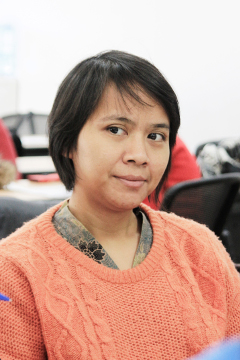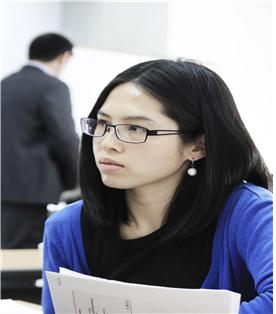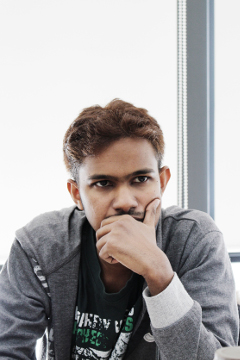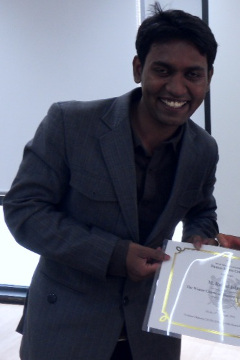Fellowship
Selection Announcement for the 2015 Human Rights and Asia Fellowship
Seoul National University Human Rights Center established the Human Rights and Asia Fellowship in order to promote research and activities related to human rights in the Asian region. This Fellowship was an expansion of the ‘Human Rights and Asia’ program, an international course hosted by the Human Rights Center, in an effort for South Korea, a country that has overcome its colonial and dictatorial past, to become a contributor to promotion of human rights in the international community. The candidates were chosen among human rights activists, researchers, and public officers who took part in the first or second batches of the ‘Human Rights and Asia’ course and submitted their research or activity proposals to be reviewed by our panel. Five fellows were selected (three people for the research category, two people for the activity category) and 5,000,000 KRW was endowed to each person to pursue their research/activity plans.
Selected Fellows
Research Category
• Rini Kusnadi: ‘Fulfillment of Human Rights of the Women Workers in the Export Processing Zone’
• Lili Song: ‘China and the International Refugee Protection Regime’
• Kirsty Taylor: ‘Human Rights in Myanmar’s Dawei SEZ: Who can help balance people and profit?’
Activity Category
- • Suren Perera: Holistic Healing Program for Secondary Victims of War in Sri Lanka
• Rabiul Islam: LGBT Rights in Bangladesh
Research Category Fellows
Rini Kusnadi: ‘Fulfillment of Human Rights of the Women Workers in the Export Processing Zone’

Contents of the Research Proposal: The sub-district Cakung is located in the eastern outskirts of the City of Jakarta and is owned and managed by the state owned company PT KBN Cakung (Persero). This study observes the conditions and the situation of the rights of the women working in the industrial area of KBN Cakung and aims to describe as well as identify the state and non-state agencies that shape and influence the violation of the rights of the women workers in EPZ Cakung; analyze and find the gaps in the labor institutional arrangement and its policy limitations in the fulfillment of human rights; and document how women workers in EPZ Cakung organize themselves in order to tackle and bargain for the fulfillment of their rights as workers and as women.
Reasons for Selection:: The researcher intends not only to identify the infringement of workers’ rights in this particular locale but also to get to the real source of the human rights problem. This kind of framework, where there is a paucity of empirical works that incorporate the root-cause and/or structural analysis approaches, is relatively rare in human rights research. The applicant makes clear that the result of this investigation will be used as a research report as well as a campaign tool, which is a laudable aspiration for a human rights researcher.
Lili Song: ‘China and the International Refugee Protection Regime’

Contents of the Research Proposal: Despite the fact that China itself remains a significant source of refugees, the number of refugees and asylum seekers entering China has increased rapidly in the past few decades. As China’s economic strength and political influence continue to grow, China’s position on refugee issues will not only affect the life and hope of many displaced persons who are forced to flee their home, but also impact the security and stability of the Asia-Pacific region. This research examines what has shaped China’s attitude towards international refugee laws and norms?; how has China’s relation with the UNHCR and other key actors in the international refugee protection regime evolved?; and finally, what roles could China play in the international refugee protection regime, especially in the Asia-Pacific region where one third of the world’s refugee population is hosted?
Reasons for Selection: China had not been very proactive in cooperating with UNHCR in the past, but is playing a greater role in refugee protection mechanism these days. This project will contribute to the scholarship by exploring China’s attitude towards international refugee laws and norms. This is a very timely subject against the backdrop of increased international economic cooperation in Asia, and has great implication in dealing with human rights in the broader Asian context.

Contents of the Research Proposal: While some development practitioners express desire to bring business “on board” to boost countries’ economic development, others have voiced concern over conflicts of interest between profit and human development. This paper will examine the current lack of a right to remedy human rights abuses linked to Myanmar’s new special economic zones (SEZs) and the Dawei SEZ (DSEZ) in particular, asking what opportunities can be taken by which actors in order to mitigate them. Specifically, this paper will map the current and potential human rights abuses linked to the DSEZ, with particular focus on abuses of the right to land; map the actors (e.g. Myanmar government, international organizations, CSOs etc.) that could mitigate these human rights abuses, outlining what efforts have been made so far and spaces for further action; and outline the role of the private sector in the nexus between economic development and human rights in relation to the DSEZ.
Reasons for Selection: This is a very timely subject and will contribute to the improvement of the Dawei SEZ. The potential conflict between the human rights approach and economic/developmental cooperation are fundamental new challenges, and this project deals with a great example of this matter in the context of Myanmar’s development. This is a classic example of a research proposal which has an important implication in a developing country setting.
Activity Category Fellows

Contents of the Activity Proposal: The Sri Lankan society experienced a 30 year prolonged armed conflict that changed the psychological landscape of people. A large number of combatants, civilians and members of the separatist group underwent the negative consequences of combat trauma. From a psycho-social standpoint, we propose to conduct residential “Holistic Healing” programs for the holistic wellness of the secondary victims of war, the widows, the families of the disappeared and the families of the political prisoners and continue to work with them until they are totally healed. From a legal standpoint, we want the current habit of tacit approval, by the society, of torture to be debated especially with regard to suspects under the Prevention of Terrorism Act so that the current practice of using torture in investigations can be rejected, allowing for a strong movement denouncing such a practice to emerge.
Reasons for Selection: In a country where people suffered a long civil conflict, many are survivors of the most horrific acts of violence and victims of torture. Despite the clear need to provide support to this group, they must often live without such support and adjust on their own to life after conflict. This proposal sets out several specific interventions to provide psycho-social and legal aid in a particular locality, which lends confidence to the feasibility of the proposal.

Contents of the Activity Proposal: Gender and sexuality issues, including same-sex behaviors are, in general, regarded as taboo in Bangladesh with almost no discussion or support. This team, made up of members from the National Human Rights Commission (NHRC) and the Bandhu Social Welfare Society (BSWS) – a national community led non-government organization formed in 1996 to address concerns of human rights abuse and denial of sexual health rights, and provide a rights-based approach to health and social service for the sexual minority populations in Bangladesh – would like to provide various activities including documentation of human rights violations; arranging training on human rights and documentations process for local rights defenders; involving electronic and printing media to address rights violations; and consultation meeting with policy makers and with human rights based organizations.
Reasons for Selection: The state of LGBT rights in Bangladesh as described clearly needs redress. In addition to the discrimination that this population faces in accessing basic social services and employment opportunities, they are subjected to stigma and sexual violence. As they are a part of the public that is often least able to defend their rights, the promotion of awareness of their rights among the group must always be the first step toward helping them claim their rights. This kind of activity is likely to be the start of a long process of awareness raising that will need to continue with the affected population, the general public, and specific duty-bearers.

